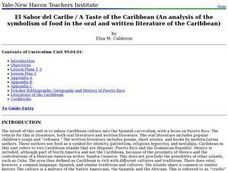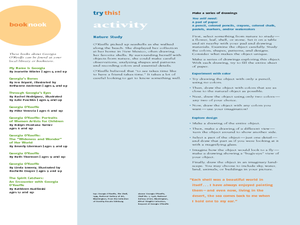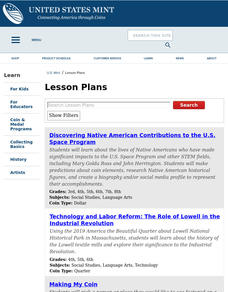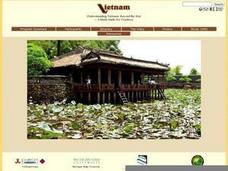Curated OER
Native American Friendship Dance
Students demonstrate the proper steps in sequence to the Native American Friendship Dance.
Curated OER
A Taste of the Caribbean
Students are introduced to the foods and traditions of the Caribbean. In groups, they brainstorm their own definition of culture and review the physical and political geography of the Caribbean. They spend time sampling different foods...
Curated OER
Voyage to the New World
Students examine the exploration of the New World. They write a descriptive account of the first encounter between Europeans and Native Americans, analyze and label maps, plot Columbus's journey on a map, and write a chapter summary.
Curated OER
Bartering Through the Seasons
Fifth graders explore bartering. In this bartering lesson, 5th graders investigate bartering between the American colonies. Students study the climate and geography of neighboring colonies and investigate crops native to each area.
Curated OER
Gold Rush Abolitionists: How different was the role of Spanish-speaking blacks under Mexican rule from the role of English-speaking blacks under U.S. rule?
Students determine how Spanish-speaking blacks and English speaking blacks were treated differently. For this emancipation lesson, students compare the Mexican and American rules regarding slavery.
Curated OER
Harvesting the New World: Changing Land Uses and Contact Between Cultures in Colonial Times
Ninth graders differentiate the Native American and European values. For this world history lesson, 9th graders define colonialism in their own words. They study the effects of epidemics and other diseases to Native American populations.
Curated OER
Industrial Revolution in America: Exploring the Effects of the Heat Engine on the Growth of Cities
Students research the development of the steam engines. In this US history lesson, students analyze the impact of this invention to civilization. They discuss the events leading to the growth and development of different cities.
Curated OER
Wisconsin
In this Wisconsin state history activity, 4th graders read two pages of information about Wisconsin then complete 10 true and false questions.
Curated OER
The Beautiful Works of Georgia O'Keefe
Learners discover the art of Georgia O'Keefe. In this art history lesson plan, students investigate the influential power nature has on art. Learners create their own works of art by observing local nature.
Curated OER
Ancient Myths Retold
Students are introduced to mythology and create modern versions of ancient myths based on figures represented on modern U.S. coins.
Curated OER
Jamestown in Context: The Colonization of North America
Students analyze the significance of Jamestown in the broader picture of colonization and analyze a historical document to determine the effects of previous explorations on the expectations of the Jamestown colonizers
Indian Land Tenure Foundation
Leaders' Decisions and Actions
Community leaders try to make choices that protect the community and the environment. Little ones learn about how tribal communities look to their chief to guide the decision-making process. Your class will become part of the community...
Curated OER
Sunken Millions: The Way West
Recover sunken treasure with this interactive PowerPoint! Break your class into two teams: the divers and the surfers. They'll work together to answer 20 multiple choice questions, reviewing major events that occurred during the 1800s....
Curated OER
European Explorers of North and South America
Sixth graders explore the connection between the geography of America and the migration of the Native Americans to the American continents to the future conquering of the continents by the Europeans. They discuss the causes and effects...
Curated OER
The Puzzle of the Ice Age Americans
Students describe alternative theories for how the first humans cane to America. In this human origin instructional activity students study the origins of the first Americans.
Curated OER
A Brief History of Vietnam (1858-2004) and Its Evolving Communist System
Students examine the French colonization of Vietnam, the Vietnam War, and the current evolving Communist system. They develop political maps, outline the major events of the Vietnam War, write an essay, and compare/contrast democracy...
Curated OER
Ancient Story Problems
Pupils research ancient civilizations, and develop story problems using symbols and coins from those times. They retell these story problems using modern terms and coins.
Curated OER
History Close to Home
Students examine primary sources as related to Nevada and the Civil War. In this United States history lesson, students gather and analyze various primary sources in small groups and interpret unknown vocabulary words by using context...
Curated OER
History Quiz 67
In this history activity, students take a multiple choice quiz about the geography of famous empires. Students complete 4 multiple choice questions.
Curated OER
Native American Ceremonies
Second graders explore cultural rituals by researching Native American people. For this Native American ceremony lesson, 2nd graders read the story Indian Festivals by Keith Brand and identify the naturalistic attitude of the Native...
Channel Islands Film
Once Upon a Time (Sa Hi Pa Ca): Lesson Plan 3
What was the most significant tool used by the Chumash? How did the environment make the tool possible? What group behaviors allowed the Chumash be be successful for thousands of years? After watching West of the West's documentary Once...
National Woman's History Museum
Sacagawea
Mind maps are great tools. Teach your classes how to use mind maps to collect, organize, and retain information with a lesson that asks learners to research the life of Sacagawea and use mind maps to record their findings.
K20 LEARN
Worcester v. Georgia: Cherokee Sovereignty and Actions of the U.S. Government
Young historians study the Supreme Court case "Worcester v. Georgia" and note instances where the Justices defended the sovereign rights of the Cherokee. They also examine the actions of President Andrew Jackson and the provisions of...
Curated OER
The Cultural Significance of Naming
The Navajo would disagree with Shakespeare that the naming of things is irrelevant. Navajo people have to earn their names. Middle schoolers learn about the cultural significance of Navajo names in a lesson that uses a video and reading...

























